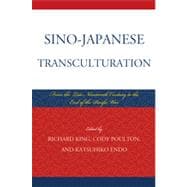
Note: Supplemental materials are not guaranteed with Rental or Used book purchases.
Purchase Benefits
What is included with this book?
| Preface | p. vii |
| Introduction | p. 1 |
| A Shared Heritage | |
| Straddling the Tradition-Modernity Divide: Huang Zunxian (1848-1905) and His Poems on Miscellaneous Subjects from Japan | p. 19 |
| Waves from Opposing Shores: Exchanges in a Classical Language in the Age of Nationalism | p. 33 |
| Pan-Asian Romantic Nationalism: Revolutionary, Literati, and Popular Oral Tradition and the Case of Miyazaki Toten | p. 45 |
| Confrontations with the Modern | |
| On the Emergence of New Concepts in Late Qing China and Meiji Japan: The Case of Religion | p. 71 |
| Collaborating, Acquiescing, Resisting: Early Twentieth Century Chinese Transculturation of Japanese Literature | p. 99 |
| Lu Jingruo and the Earliest Transportation of Western-Style Theatre from Japan to China | p. 125 |
| The Culture of Occupation | |
| Affective Politics and the Legend of Yamaguchi Yoshiko/Li Xianglan | p. 143 |
| Japan's Orient in Song and Dance | p. 167 |
| Manchukuo and the Creation of a New Multi-Ethnic Literature: Kawabata Yasunari's Promotion of "Manchurian" Culture, 1941-1942 | p. 189 |
| Coming to Terms with History | |
| Colonial Nostalgia or Postcolonial Anxiety: The Dosan Generation In Between "Restoration" and "Defeat" | p. 211 |
| The Road Taken, Then Retraced: Morimoto Kaoru' s A Woman's Life and Japan in China | p. 227 |
| Re-acting an Actor's Reaction to the Occupation: The Beijing Jingju Company's Mei Lanfang | p. 239 |
| "But Perhaps I Did Not Understand Enough": Kazuo Ishiguro and Dreams of Republican Shanghai | p. 261 |
| Bibliography | p. 275 |
| Index | p. 289 |
| About the Authors | p. 303 |
| Table of Contents provided by Ingram. All Rights Reserved. |
The New copy of this book will include any supplemental materials advertised. Please check the title of the book to determine if it should include any access cards, study guides, lab manuals, CDs, etc.
The Used, Rental and eBook copies of this book are not guaranteed to include any supplemental materials. Typically, only the book itself is included. This is true even if the title states it includes any access cards, study guides, lab manuals, CDs, etc.